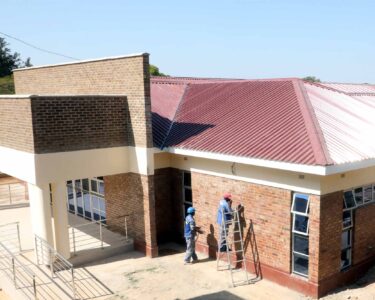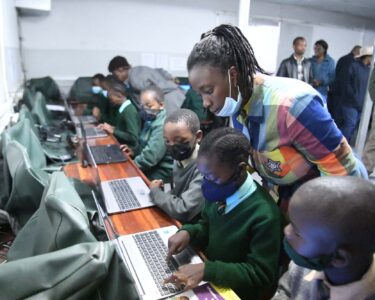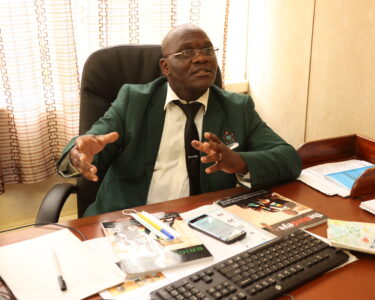Gwanda State University (GSU) is a state higher institution in Gwanda, the capital of Matabeleland South Province. It is the brainchild of the government of Zimbabwe, created to fulfil the government’s policy of having at least one university in each of the country’s 10 provinces. The university was conceptualised in 2012 before it started operating in 2015 as a University College under the National University of Science and Technology (NUST). GSU started operating as a stand-alone university in 2016 through an Act of Parliament and was mandated to specialise in veterinary sciences, irrigation engineering, environmental engineering and ecosystems restoration in line with its location in semi-arid Matabeleland South.
While the university is operating from the disused Epoch Mine, and has renovated buildings and housing to ensure all staff and students can be accommodated for courses there, it has an 87-hectare piece of land in Gwanda Town where its main campus will be established.
With its focus on Mining and Agriculture, the university aims to develop enlightened human resources through world-class teaching, research and innovation that is able to exploit factor endowment of their environment.
GSU offers courses and programmes leading to officially recognised higher education degrees such as bachelor degrees in several areas of study. The university acknowledges that university life is not only about being behind the desk 24/7. A variety of services and programmes are offered to develop a holistic student even outside the classroom. These include: Student Leadership Training, Interview Techniques, Orientation programmes, Career Guidance, Stress management and Community Service.
Despite being one of the country’s youngest universities, GSU is determined to turn itself into one of the jewels of the country’s institutions of higher learning.
On 18 November 2022, GSU made Matabeleland South Province proud as it witnessed four memorable events that will linger in the minds of many people for a long time.
On this historic day, GSU installed President Mnangagwa as its first Chancellor and Professor Doreen Zandile Moyo as his Vice-Chancellor. The day also saw the capping of 15 of its pioneer students and the laying the foundation stones by President Mnangagwa for the construction of three transformative buildings at the campus – the Engineering Laboratory and Innovation Complex; Lecture Block and the Agro-Industrial Park.
It was a celebratory day for a culturally diverse Matabeleland South as poets, imbube ensemble groups and traditional amabhiza dancers entertained the guests at the GSU’s Insiza campus.
Addressing students and guests, President Mnangagwa said it was historic for Matabeleland South to have a university in its backyard. He paid tribute to late national heroes Vice President John Landa Nkomo and Professor Phineas Makhurane as well as Zanu-PF Women’s League deputy secretary and former minister Angeline Masuku for their roles in the establishment of the university.
Values and principles of innovation, integrity, innovativeness and excellence, among others, should guide the new university, he said.
“The establishment of GSU is the culmination of a bold policy of having at least one State university in each of the country’s 10 provinces. This is echoed by our quest to realise development that leaves no one and no place behind. It is also an acknowledgement that education is a right that should be accessed by our citizenry, no matter where one lives,” said President Mnangagwa.
He said it was up to the community to ensure their children are enrolled at the university. “Yekelani abantwana bazofunda lapha,” said the President, adding that the province should now strengthen the teaching of subjects, construct laboratories and relevant facilities that will see students advance in science, technology, and innovation-related fields. “Under the Second Republic, those with talent are being rewarded and supported. I, therefore, challenge young people in Matabeleland South and the nation as a whole to dream big and realise their full potential,” he said.
The government, he said, supported the growth of higher and tertiary institutions as these were key to national development.
“It is noteworthy that the university has developed key infrastructure in a short space of time through ingenuity, and prudent and timely use of available financial resources. Well done. Your efforts led to the phenomenal transformation of this campus. Going forward, the student population growth must always be in tandem with infrastructure development at all our institutions of higher learning,” said President Mnanagwa.
“To this end, the Second Republic is determined to grow the higher and tertiary education sector as the bedrock for scientific, technological and innovation-driven modernisation and industrialisation in our country.”
He said through heritage-based Education 5.0 the country will leapfrog towards development.
President Mnangagwa said the continent was now benefiting from Zimbabwe’s skills development.
“To this end, this week, I was pleased to send off a team of specialist doctors to participate under the ‘Love Without Reason Cleft Lip and Palate Surgical Camp’ in Kisumu, Kenya. As a nation, we are proud that our education and health delivery systems have trained skilled doctors of high calibre who also care about humanity to a level where they undertake philanthropic missions to sister republics on the continent of Africa. Such patriotic and pan-African attitudes should be emulated not only by others in the medical profession but across all professions,” he said.
In this context, President Mnangagwa challenged all state universities, including GSU, to come up with strategies that enable institutions to become specialist centres.
He called on GSU to coordinate partnerships in the agriculture and mining sectors to produce cutting edge breakthroughs for the country.
“The domestication of mining sector value chains through value addition and beneficiation must see the university registering its footprint in this respect. Focus must also be on providing graduates and academics with appropriate ecosystems to develop relevant technologies that meet the unique realities of the institution’s mandate area. The collaboration between GSU and the Russian State Geological and Mining University is a commendable initiative,” noted President Mnangagwa.
The newly installed GSU Vice Chancellor, Professor Moyo, said 15 students were graduating from the institution since it became a stand-alone university.
“Today, the first cohort of 15 GSU graduates from the Faculty of Natural Resources Management and Agriculture will be graduating with degrees in Crop Science and Animal Science. Of these nine, which translates to 60 per cent, are females; while six, which translates to 40 per cent, are males. The last group of engineering students under the GSU and NUST collaboration graduated last week at NUST. To date, GSU has graduated 123 students under NUST,” said Professor Moyo, noting that the university had a 442-student population while its staff is advancing in academic qualification with seven of them attaining post-doctorate degrees this year alone.
Two best graduating students — Quelani Nyoni and Sandra Masuku — walked away with the Emmerson Dambudzo Mnangagwa Chancellor’s Award and were gifted with US$1,000 each in prize money.
Professor Moyo said GSU was committed to implementing National Development Strategy 1 (NDS1), which is a step towards attaining Vision 2030.
Several developments had been lined up at the institution with the construction of the Gwanda campus stating next year.
“To date, 25 student blocks that can accommodate 500 students and 15 housing units that can accommodate 60 families have been renovated. I am pleased to let you know that these refurbishments have enabled the university to accommodate its students and staff at the Epoch Mine campus. Renovations of the remaining buildings will be completed in the coming year and will accommodate a further 100 students and 20 families,” she said.
There is no doubt that “this young baby” is fast positioning itself to champion development through research and innovation in two sectors that anchor the country’s economy – agriculture and mining.
BOXED:
Professor Doreen Zandile Moyo: A profile
In 1965, two teachers based in Gwanda, the late William George Senda and Ellah Ndlovu-Senda, conceived a child and christened her Doreen Zandile. They inculcated a strong culture of education in the then-young Doreen who started her education at Donkwe-Donkwe Primary School in Kezi, Matabeleland South Province, before moving to Bulawayo where she completed her primary education at Matshayisikhova Primary School in Luveve.
She proceeded to Mpopoma High School where she pursued her studies up to Advanced Level.
True to the aspirations of her parents, she enrolled at the then only university in the country — the University of Zimbabwe — in 1986 and graduated with an honours degree in Biological Sciences in 1988. She took home the Book Prize.
Thirty-four years later, Professor Moyo returned to her birthplace, not just as an ordinary woman but as an accomplished scholar and seasoned administrator.
She now has a huge responsibility on her shoulders to develop GSU and ensure that the country’s mining and agriculture sectors benefit from the university. In response to her installation, Professor Moyo said: “Your Excellency, the President of the Republic of Zimbabwe, and Chancellor of GSU, I am deeply honoured to have you preside over my installation as the second Vice Chancellor of GSU. I do not take for granted the trust you have in me to lead this beloved institution.
“I confirm with humility that I solemnly accept the honour to serve my country in this position. This is a great occasion not only for me but also the university fraternity, the Matabeleland South Province and the women of Zimbabwe.”
Professor Moyo paid tribute to Professor Ntombizakhe Mlilo and the late Dr Mangena who presided over GSU before her. She also paid tribute to Midlands State University (MSU) founding Vice Chancellor Professor Ngwabi Bhebhe and his successor Professor Victor Muzvidziwa for mentoring her into leadership positions.
She also paid glowing tribute to her parents for their role in her upbringing. “I wish, in a special way, to pay tribute to my late parents, William George Senda and Ellah Senda (nee Ndlovu) for their unfailing love and instilling in me a culture of integrity and hard work. To the Senda and Ndlovu clans that have been there for me, I thank you for your words of wisdom and encouragement,” she said, while thanking her children Michael, Dorothea and Deborah Moyo for standing with her.
She said being at the helm of GSU comes with a lot of responsibility and she was ready to deliver.
Professor Moyo said guided by Education 5.0, she will ensure the university produces graduates that fit and compete in the modern world. “The university is committed to providing an environment that is conducive for students to flourish and be equipped to succeed in the Fourth Industrial Revolution by providing them with inquiry-led teaching and learning opportunities.
“GSU will leverage on its mandate that mainly focuses on animal and veterinary sciences, mining and engineering and environmental restoration to fully participate in the attainment of national aspirations such as Vision 2030 and the [United Nations] Sustainable Development Goals,” she said.
Prof Moyo revealed that the infrastructure development of the university will be part of her mandate. She will also spearhead research, innovation, industrialization and commercial units at the university. “Your Excellency and Chancellor, in conclusion, let me reiterate my commitment to upholding the values of good corporate governance and achievement of national aspirations,” she said.
President Mnangagwa congratulated Prof Moyo for setting the tone for other women to take up positions in male-dominated fields.
He said she was a scientist of repute and her capabilities should be harnessed to steer the university to greater heights. “I congratulate Professor Doreen Zandile Moyo upon her installation as the Vice Chancellor of GSU. This is a well-deserved recognition of her professionalism, hard work and successes as a distinguished academic, researcher and administrator.
“Her courage to take up this position in a male-dominated field, moreso here in a remote setting, must be a source of inspiration to many talented women to take up leadership positions across the economy, no matter the seeming odds,” said the President.
Building GSU brick by brick
The three transformative buildings – the Engineering Laboratory and Innovation Complex; Lecture Block and the Agro-Industrial Park will be key in ensuring that GSU plays a strategic role in animal and veterinary sciences, irrigation engineering and management, mining engineering, environmental engineering and environmental management and ecosystem restoration.
“It is my sincere hope that the stones that I have laid today have placed GSU on a firm development trajectory which will see the institution transform into an innovative and self-sustaining entity,” said President Mnangagwa.
The site construction foreman, Everest Bushe, told Brick by Brick magazine that the Engineering Laboratory and Innovation Complex will house seven laboratories – the Ore Receiving, Assaying, Environmental, Characterisation, Physical Metallurgical, Rock Mechanics, Engineering Workshop and Productions and Geomatics and Surveying Storage laboratory.
“The project started in September 2021. At first there were some challenges in terms of resources and so we suspended the project for a while. Work resumed around February this year before construction work was suspended again due to fresh challenges. But the construction team was not idle as it was integrated into the team building GSU staff houses. We built about 12 housing units before returning to our original assignment.
“It’s very difficult to say when exactly we are going to finish building this laboratory. We are having challenges with our suppliers, who are nearly always out of stock. If we had obtained everything we needed on time, we would have been in a position to finish building the laboratory by December (2022).
“Our procurement process should be such that we get all our materials on time. When there is a delay in sourcing and delivering materials, it makes it appear like we are sleeping on the job. Make no mistake, local builders are very good at their job, but are often let down by delays in procurement. For example, I bought some building materials in June, but they were only delivered around September/October. As I speak, I am yet to receive some of the material. This prolongs the project and can be quite frustrating,” explained Bushe.
Delays apart, Bushe believes the end product is something to look forward to. “This is going to be a very unique laboratory, the first of its kind in the country. It’s not only going to benefit Gwanda State University, but the local community as well, not to mention the country at large. The mining industry will be able to take advantage of this laboratory as the country goes full throttle boosting its mineral output.
The Acting Dean in the Faculty of Natural Resources Management and Agriculture, Dr Busani Moyo, was equally upbeat when asked about GSU’s cattle and goat project.
“Our cattle and goat project is tailored to achieve Education 5.0 under which both students and lecturers will be involved in carrying out research, innovation and industrialisation. In total, we have about 207 cattle and 220 goats, which are the seed that we are going to use in our research. After research, we move on to innovation followed by industrialisation or commercialisation of our products. For example, we will set up a butchery to sell meat and other value-added products. We also have a thriving poultry project with about 2,000 layers.
“This project fits very well into the Second Republic’s Vision 2030 because when the students graduate, they will become entrepreneurs, thanks to our hands-on approach. Our students are really excited to participate in this project because they know we are equipping them not only with knowledge but with the skills to survive post-graduation.
“The project is funded by the Ministry of Higher and Tertiary Education, through ZIMDEF [the Zimbabwe Manpower Development Fund],” said Dr Moyo, reflecting on the “dark days” of the past when GSU students had to rely on third parties for their practical lessons. “It was not only cumbersome, but costly in terms of time and resources. When you rely on third parties for your research needs, the results are not as good as they should be compared to when you do things under your own environment. And, don’t forget, practice makes perfect.”
For the record, ZIMDEF was established by Section 23 of the Manpower Planning and Development Act of 1984 (now revised Manpower Planning and Development Act, Chapter 28:02 of 1996) with the mandate of funding the development of critical and highly skilled human capital in Zimbabwe. (With additional reporting courtesy of the Chronicle)





